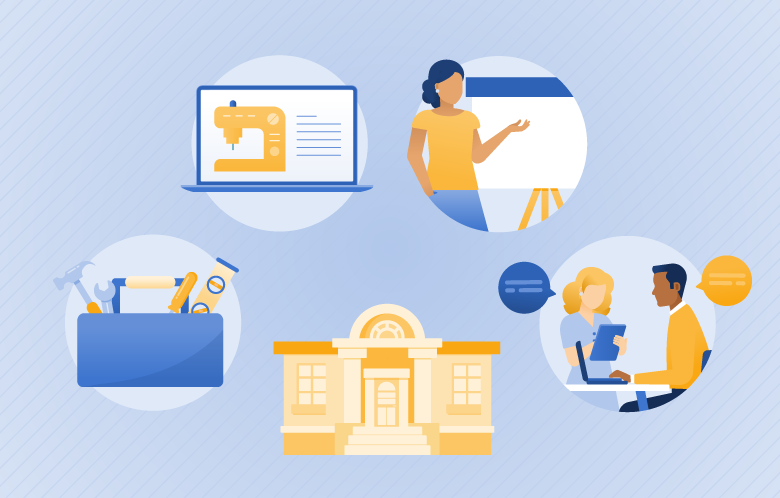Did you know that National DIY Day is celebrated annually on April 2 in the United States? In recent years, the DIY/maker movement has opened doors for a new generation of crafters, tinkerers, remodelers, entrepreneurs and other individuals who want to learn how to do things on their own. These makers and do-it-yourselfers can be motivated by the need or desire to save money, solve a problem, become self-reliant, or simply relax and have fun.
Public libraries have long offered free and equitable access to information, cultural experiences and educational opportunities, so National DIY Day presents a great opportunity for library outreach. Here are four ways libraries can support DIY devotees all year long:
1. Provide access to tools and equipment: Many libraries offer access to tools and equipment that people can use to pursue hobbies and complete DIY projects. For example, libraries with makerspaces can offer 3D printers, laser cutters or sewing machines available for patrons to use. Libraries that have embraced the Library of Things movement by lending nontraditional items, such as carpentry tools, can also be especially helpful for people who don't have the space or money to buy their own.
2. Provide access to resources and materials: Libraries curate a wide variety of books, magazines, and online resources related to DIY projects. They also offer access to databases or other resources that can help people find the information they need to complete their DIY projects. These resources from EBSCO can help libraries support DIY enthusiasts and their variety of interests:
- Tinkerers
- Auto Repair Source: Powered by the automotive experts at MOTOR, Auto Repair Source provides library users with the most accurate, authoritative and up-to-date service and repair information for thousands of domestic and imported vehicles. It includes step-by-step repair information, diagrams, maintenance schedules, parts and labor estimates, service bulletins and recalls.
- Small Engine Repair Reference Center: This reference database provides detailed yet user-friendly repair guides for all manner of small engines, from lawnmowers to snow throwers. All content is organized in a unique, easy-to-use interface so that users can quickly find the information they need.
- Flipster Digital Magazines: Nothing makes for an exciting read quite like automotive magazines. Popular picks such as Popular Mechanics and C10 Builder's Guide take a deep dive into specs and are sure to delight serious auto enthusiasts, while casual fans will be happy to browse through the colorful pages of selections such as Car & Driver, Autocar and Motor Trend.
- Crafters / Renovators
- Hobbies & Crafts Reference Center: This easy-to-use database includes detailed "how-to" instructions and creative ideas that meet the interests of virtually every hobbyist. Users will find complete articles from hobby and craft magazines, hobby profiles, recipes and how-to videos.
- Home Improvement Reference Center: Through a collection of comprehensive full-text content, this database provides do-it-yourselfers with detailed, user-friendly “how-to” information covering a variety of home improvement and repair projects.
- Flipster Digital Magazines: From woodworking and metalworking to jewelry and beadwork to quilting and crocheting there is a magazine for every crafting taste. Popular picks available through Flipster include This Old House, HGTV Magazine, Creative Beading and Quilter's World.
- Small Business Owners & Entrepreneurs
- Small Business Reference Center: Makers often want to turn their passions into side businesses. This database contains exclusive full text for many top consumer small business reference books, as well as tools to address many small business topics. It includes business videos, a help and advice section, and details on how to create a business plan.
- Legal Information Reference Center: This database is designed to assist the public in legal matters of all kinds. It includes exclusive full text for many top consumer legal reference books, as well as thousands of legal forms.
- Entrepreneurial Mindset Training Course: This eight-module, self-paced course enables prospective entrepreneurs to learn the underlying beliefs and behaviors that can help them start a new business, pursue a new career, accomplish personal goals, and achieve richer lives.
3. Host workshops and classes: Libraries can offer workshops and classes on a variety of DIY topics, such as woodworking, jewelry making and genealogy. These classes can provide instruction and guidance for people who are just starting out with a new hobby or project.
For example, a library subscribing to the Entrepreneurial Mindset Training Course can build an eight-week program around the course modules and encourage crafters and other individuals looking to start their own businesses to enroll.
4. Build community: Libraries can provide spaces for people to come together and work on DIY projects as a group. These spaces can be makerspaces or other designated areas of the library for gathering, such as meeting rooms. Working together on projects can foster a sense of community and collaboration, as well as provide opportunities for people to learn from one another.
Overall, the library can be a valuable resource for people who are interested in pursuing DIY projects. Libraries provide access to tools, materials, information and a supportive community of like-minded individuals.

